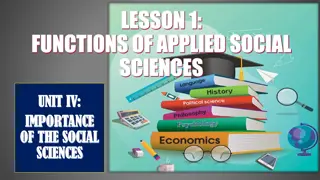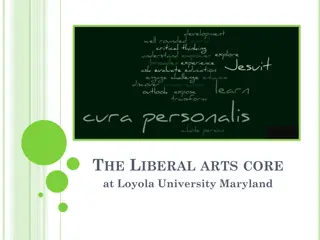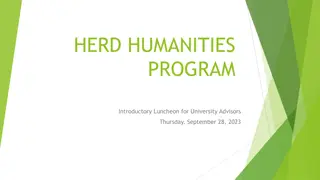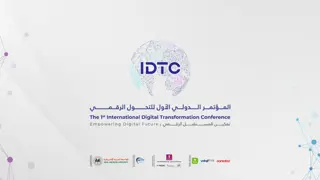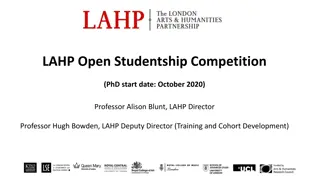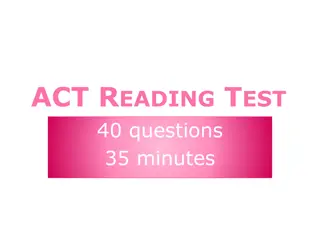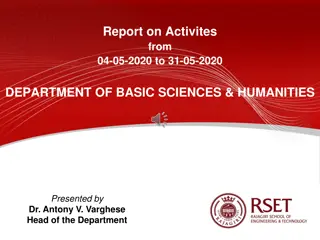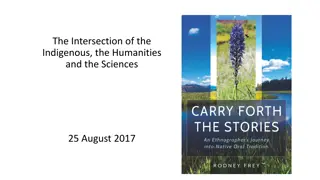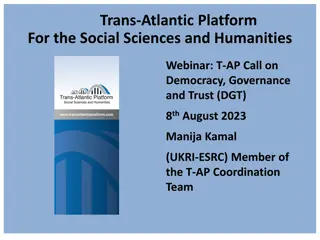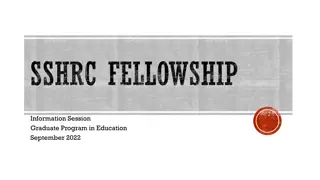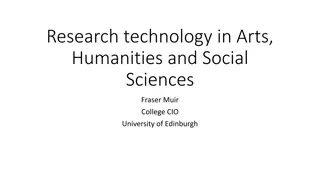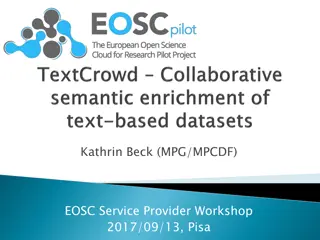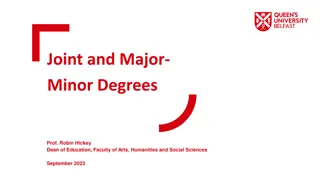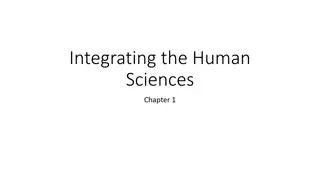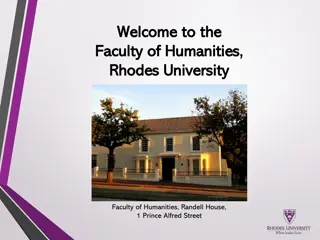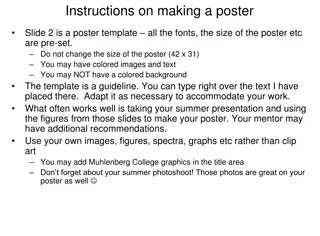Exploring Transformation in Humanities and Social Sciences
Understanding and engaging with the theme of transformation in academia, particularly in the humanities and social sciences. Discussing the impact of transformation in research, policy, and strategy. Highlighting the need for transdisciplinary approaches in knowledge production and the role of power, politics, and agency in driving transformation.
Download Presentation

Please find below an Image/Link to download the presentation.
The content on the website is provided AS IS for your information and personal use only. It may not be sold, licensed, or shared on other websites without obtaining consent from the author. Download presentation by click this link. If you encounter any issues during the download, it is possible that the publisher has removed the file from their server.
E N D
Presentation Transcript
Transformational ways of living and learning: ECR network event
Transformational ways of living and learning: ECR network event How the theme of transformation is used in the humanities and social sciences Discussion about how we engage with transformation in our own work Next steps for the ECR transformations network
Transformations: Phase 1 Project commissioned by the School of the Humanities and Social Sciences Review of academic and grey literature Interviews with University of Cambridge staff
Transformations: Phase 1 Within academic scholarship, transformation is typically understood to refer to a significant reordering which challenges existing structures to produce something novel (Blythe et al., 2018). A substantial change of social systems, which could be spontaneous, and is often the result of intentional decisions and actions (Merkel et al., 2019). The concept is used across a wide array of disciplines and issues.
Term Count Leadership 125 Social 51 Innovation 47 Service 32 Based 32 Digital 30 Urban 28 Research 28 Role 27 Climate 25 Food 24 Energy 24 Sustainable 23 Change 23 Using 21 Green 21 Performance 20 Knowledge 20 Covid 20
Transformations Research Increasing demand for transdisciplinary co-production of knowledge (Schneider et al., 2019) Several key areas of focus: knowing whether transformation has occurred or is occurring; knowledge production and use; governance; how dimensions of social justice inform transformation; working with the present to create new futures; etc. (Fazey et al., 2018) Power, politics and agency in transformation (Patterson et al., 2017; Blythe et al., 2018; Castles, 2010).
Transformation in policy and strategy In UK government policy: transform and derivatives of the term are used in 624 policy papers and consultations since 2020, largely in relation to public service restructuring In research strategy: transformation is understood as necessary to respond to major policy problems. - UKRI s Transforming Tomorrow Together strategy document
Transformation in social sciences research Transformation is seen primarily as a signalling word rather than an analytical lens. Transformation communicates ambition but implementation is not easy. Researchers may use transformation to appeal to funding bodies. Further debate is needed.
Recommendations There is a need for researchers to focus more sharply on what transformation means, with an emphasis on politicisation. In Cambridge, ECRs should be a key part of the University s engagement with transformation discourse. Researchers should engage with stakeholders outside academia to ensure conceptualisations of transformation respond to real world challenges.
Transformations: Phase 2 An ECR network for those whose work engages with transformation Establishing links across disciplines and understanding how transformation is employed across research in the School. A symposium on the 16th May for ECRs to share research and expand networks.
Discussion What does transformation mean to you? How can we tell if an idea or intervention is transformative? How much has to change to refer to that change as a transformation? What is it that would have to change, are people looking at practices, norms, processes? Are you interested in/researching historic or future transformation? Are you interested in/researching transformations that are the result of deliberate initiatives, choice, or necessity based on circumstance (such as climate change responses)? How long would something have to be sustained to be transformative?
https://www.cchpr.landecon.cam.ac.uk/ https://www.educ.cam.ac.uk/ hh529@cam.ac.uk




